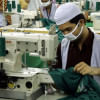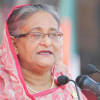Hiring people with disabilities

Bangladesh's garment industry is aiming towards reaching an export target of USD 50 billion by 2021. An abundance of potential labour gives our ready-made garment (RMG) industry a comparative advantage. The sector can also benefit a lot from the country's existing demographic. Despite such opportunities, many RMG factories are still facing a shortage of skilled labour.
According to the World Health Organisation (2011), persons with disabilities make up 15 percent of the population. Developing countries lose up to seven percent of their Gross Domestic Product (GDP) due to the exclusion of persons with disabilities from the labour market. When persons with disabilities have access to skills training, they can significantly meet the rising demand of skilled labour, which provides considerable economic advantages. Many RMG employers are increasingly recognising the value of persons with disabilities in their workforce. They say that persons with disabilities can equally contribute to the production process of certain jobs, even with higher job retention rates.
To promote an inclusive environment, RMG factories simply need to make some small adjustments at their workplaces. They also need to have disability friendly policies. With expertise in inclusion, a national Non-Governmental Organisation (NGO) named Centre for Disability in Development (CDD) provided advisory services on inclusion of persons with disabilities in the workforce among 200 RMG factories from December 2014 to March 2017, with technical support from Promotion of Social and Environmental Standards in the Industry (PSES). PSES is a joint project between the governments of Bangladesh and Germany. It is being implemented by the Deutsche Gesellschaftfür Internationale Zusammenarbeit (GIZ) GmbH, which works on behalf of the German Federal Ministry for Economic Cooperation and Development (BMZ), in partnership with the Government of Bangladesh.
With advisory support, more than 150 factories in the RMG sector are gradually 'going inclusive'. They have installed audio and visual alarms, accessible lifts, ramps and handrails. Factories have also marked floors, emergency exit points and toilets with colour signage and pictogram to improve accessibility. Some of them even made necessary amendments in their company policies.
In Bangladesh, approximately 3.2 million youths have some form of disability. High quality skills development is one of the pathways that can lead them to employment. According to the National Skills Development Policy, 2011, and the circular of the Ministry of Education, five percent of seats are reserved for persons with disabilities in all technical institutions, which show the interests of the government and strong determination towards disability inclusive skills training. In addition, bilateral and multilateral agencies, private sector and civil society organisations have also come forward to address the cause.
In order to ensure effective implementation of the five percent quota for persons with disabilities, PSES provides technical guidance to selected vocational training institutes on how to improve the accessibility of their training programme for these students. PSES provides training on inclusive training techniques and relevant disability contents for both teachers and instructors. However, many challenges and barriers still remain regarding disability inclusion in skills training. For instance, persons with disabilities may lack motivation to access skills training due to a lack of confidence and support from their families. To address these challenges, PSES worked with the Disabled People's Organisations (DPO) through the Inclusive Job Centre (IJC), which is located at Centre for the Rehabilitation of the Paralysed (CRP). This network among organisations helped them get access to skills training and employment.
Since 2014, PSES has supported the training of more than 250 women with disabilities at Shahid Sheikh Fazilatunnesa Mujib Women Training Academy. They are among 2,500 women who have received such training. On one hand, the IJC professionals extended advisory support to factories regarding inclusion; and on the other, provided assessment, counselling, referral, linkage, placement, and retention support for persons with disabilities. With the support from Bangladesh Garment Manufacturers and Exporters Association (BGMEA) and Bangladesh Knitwear Manufacturers and Exporters Association (BKMEA), the IJC has placed 150 persons with disabilities in different RMG factories, from December 2015 to May 2017.
National Skills Development Council (NSDC) has recently approved the National Strategy for Inclusion of Persons with Disabilities in skills development. NSDC is well positioned to coordinate with different actors to promote inclusive vocational trainings in Bangladesh. NSDC is also keen to replicate the model of disability inclusive training in regular skills training programmes.
Finally, it is expected that through coordinated efforts between the government and the private sector and other stakeholders, sustainable economic growth in the garment and textile industry will be ensured. Civil society organisations, including DPOs, have to continue providing their support to the initiatives of the government and the private sector in regards to inclusive skills development. Combined efforts between all the parties will surely help persons with disabilities protect their rights and give them access to skills training and employment in Bangladesh.
S M Ali Hasnain Fatme is Manager Corporate Affair's, Centre for Disability in Development (CDD) and Dr Md Anisuzzaman is Senior Advisor, Deutsche Gesellschaftfür Internationale Zusammenarbeit (GIZ) GmbH.

 For all latest news, follow The Daily Star's Google News channel.
For all latest news, follow The Daily Star's Google News channel. 








Comments